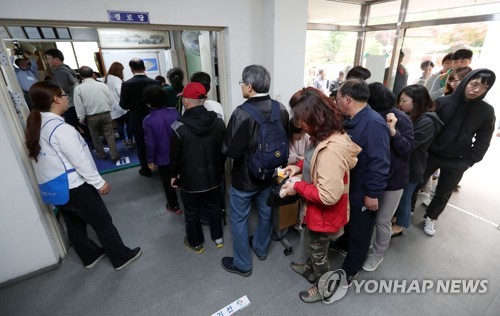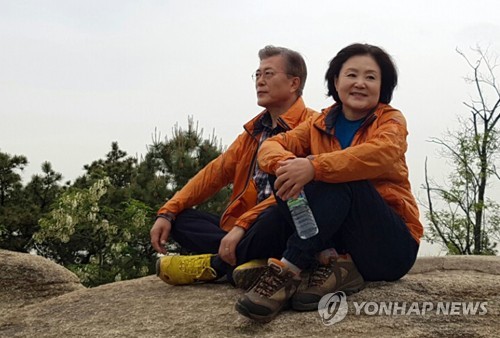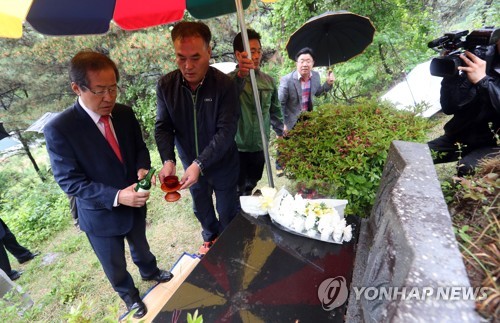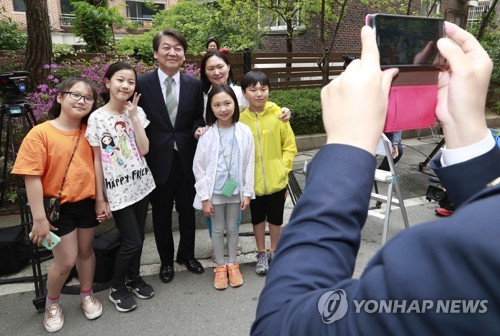More than 60 percent of South Korea's voters have cast their ballots with five hours remaining in the presidential election on Tuesday, the National Election Commission (NEC) said, indicating high public interest in a poll following the first impeachment of a president.
Turnout reached 63.7 percent as of 3 p.m., nine hours after voting began at 13,964 polling stations nationwide in a crucial election to pick a new president to lead the country for the next five years.
The tally included 26.06 percent who participated in last week's two-day early voting, as well as votes by overseas South Korean nationals and those aboard ships, the NEC said.
The turnout rate is 4.4 percentage points higher than the 59.3 percent recorded at the same point in the last presidential election in 2012.
The liberal stronghold of Gwangju and South Jeolla Province has the highest turnout so far at 69.6 percent and 68.6 percent, respectively, while the southern island of Jeju shows the lowest rate at 60.2 percent.
A total of nearly 42.48 million people, or 82 percent of the country's population of 51 million, are eligible to vote in the presidential election, marking the largest number of voters in the country's history.
The NEC said 27.06 million completed voting by 3 p.m. Voting is to end at 8 p.m.

The election comes in the wake of the March 10 ouster of former President Park Geun-hye over a massive corruption scandal that also led to her arrest and indictment.
Thirteen candidates are vying for the top elected office, but many believe the election is, in reality, a three-way race between Moon Jae-in of the liberal Democratic Party, Hong Joon-pyo of the conservative Liberty Korea Party and Ahn Cheol-soo of the center-left People's Party.

After casting his ballot, Moon and his wife went for a hike on a mountain near their home in northwestern Seoul.
Asked whether he felt relieved, he said, "I don't feel relieved at all."
Hong Joon-pyo, the nominee of the party affiliated with Park, visited his father's grave in Changryeong, 347 kilometers southeast of Seoul, after casting his vote in southern Seoul.
"I think it will turn out well," he told reporters there.
Speaking to reporters outside his home in northeastern Seoul, Ahn urged voters to come out and cast their ballots.
"Turnout has to be very high," he said. "Politics will serve its proper role when (politicians) learn to fear the people."

Yoo Seong-min of the conservative Bareun Party, which splintered off from Park's party after her impeachment, returned to his hometown of Daegu, 302 kilometers southeast of Seoul, to vote.
"I think this election is a very important election that should properly transform the world," he said to his supporters there. "Please don't obsess over a mere change of government, but think carefully about who is the person to truly change the world, and if you pick me, I am confident I will fulfill my duties well."
Rep. Sim Sang-jeung, the candidate of the progressive Justice Party, cast her vote at a polling station in her electoral district in Goyang, northwest of Seoul.
"I trust that (the people) will vote for Sim Sang-jeung to achieve stronger reform and greater change," she said.
Voting was set to end at 8 p.m. instead of the usual 6 p.m. because it was a by-election.
"There was high participation in overseas voting and early voting conducted in advance, and a voter survey by the commission shows that more people are eager to vote," an NEC official told Yonhap by phone. "We expect turnout to reach the 80 percent level."
If the rate exceeds 80 percent, it would mark the first time since the presidential election in 1997 that participation has been so high.

Unlike the previous elections, the president-elect will be inaugurated immediately after an official declaration of his or her victory by the NEC in a meeting slated for early Wednesday.
The election had been considered tilted in favor of liberal candidates from the very onset as it followed the removal of the former conservative president over corruption allegations.
Hong, the candidate from the former ruling party, however, was seen catching up with his liberal rivals at the last minute.
The last opinion poll on the election published Wednesday had Hong and Ahn tied at 18.6 percent in second place, while Moon led the race with 42.4 percent. The publication of new opinion polls has been prohibited to prevent the outcome of an opinion poll itself affecting the outcome of an election. (Yonhap)

